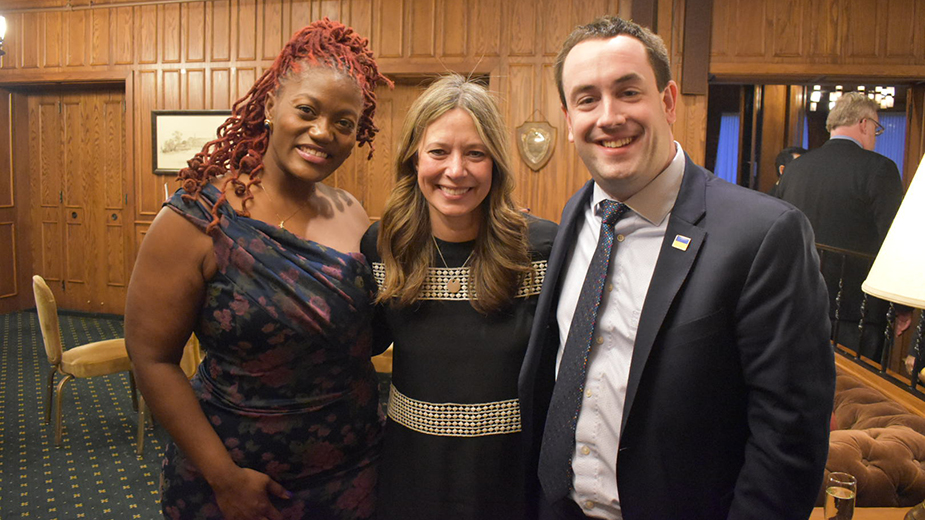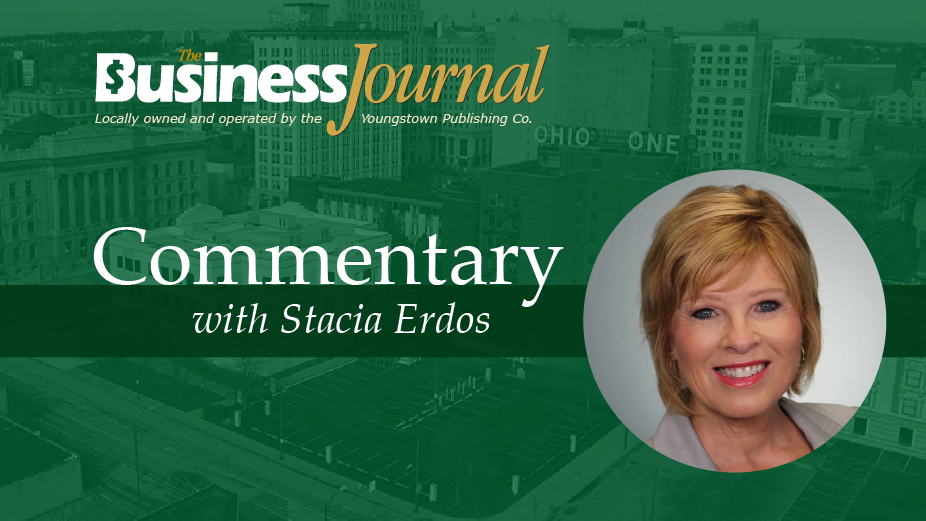By Stacia Erdos Littleton
YOUNGSTOWN, Ohio – It was a Thursday evening when I walked into the Youngstown Country Club and immediately locked eyes with an old friend having a discussion with a reporter.
The friend was petite, about my age, with light brown hair. She was as I remembered her. She looked at me with a growing smile on her face and said, “Hi, how are you?”
It had been so long since I’d seen her, my face lit up in recognition. “Oh hi! It’s nice to see you again!”
It wasn’t until I passed her, that I realized we didn’t know each other at all. She was Dr. Amy Acton, the woman I’d had an appointment with almost every day at work in those first few months of COVID – when the clock struck 2 p.m.
That brief encounter encapsulates Acton’s innate ability to draw you in and make you feel comfortable like a trustworthy friend. These are communication skills you cannot teach.
At the Youngstown Rotary Club reception that night, Acton shared how she had grown up on Youngstown’s north side, “not in the best of circumstances,” and ended up “in a really strange moment in history.”
Looking back at those daily briefings alongside Gov. Michael DeWine, Acton refers to herself as “the Ted Lasso of politics” admitting she had never been a political person. And just as Lasso from the Apple TV series was thrown into those soccer press conferences with no script nor much knowledge of how to coach this game played before thousands of spectators, so, too, was Acton thrown into a public health crisis playing out before the world.
The position of Ohio health director typically doesn’t call for a starring role in government politics. Even so, when the governor unexpectedly selected her for the post, she learned she would be provided crisis communication training by the CDC.
Spoiler alert – Amy Acton missed the training!
Knowing that leads me to ask, would she have been such an effective messenger had she not tripped over her dog, broken her pelvis – and left dependent on a walker, unable to attend the CDC training?
Not that communications training isn’t useful. Over the years, I have both received and given pointers on delivering the news and on public speaking.

But I can’t help wonder: Would it have altered Acton’s thought processes and those unscripted remarks when she was thrust into the spotlight of an unforeseen pandemic? Might she have been more self-conscious, more self-scrutinizing of what she should or shouldn’t say? Would she have come across as sincere, as reassuring to me and those 11 million other patients in Ohio?
Acton points out that there have been studies of those “Wine with DeWine” broadcasts to determine what elements in leadership communication made them so successful. Among them:
• It created a ritualized holding space where everyone could come together. Acton says those daily briefings were initially launched because of a need to answer questions from the press at a specific time.
“We really didn’t think anyone would watch the Ohio News Network at 2 p.m. each day!” she said. (But boy did we!)
• Honesty. Acton says growing up the way she did in Youngstown, she just “laid her cards on the table.”
“When I was looking in the lens of the camera, I felt Ohioans on the other side.”
• Vulnerability. “Saying ‘I don’t know” was the most natural thing because it was the truth.”
It also took courage and strength that perhaps can only be harnessed through life experiences.
I hadn’t realized how much difficulty and despair Amy Acton had witnessed in her life. As a child, Acton experienced what no child should have to live through – abuse, homelessness, neglect – before landing on her feet and graduating from Liberty High School.
As she followed her dream of becoming a doctor, she described herself as “devastated” during her residency in a New York hospital where she saw babies dying of AIDS. In her global health travels, she saw the aftermath of the horror of genocide in Rwanda. She also learned the infant mortality rate there was lower than just a block away from Ohio State University.
So when we felt fear, helplessness, and isolation in the wake of something we’d never experienced, her life experiences helped to shape the calm. The reassuring presence she presented helped to guide us through the unknown.
I thanked Acton that night (after I finally introduced myself) and also told her I was sorry for what she’d personally endured.
While she was a pillar of strength for us, she also became the target of vitriol, hate, anti-Semitic attacks, threats to her family and to her life. Still, she says the love she received from strangers was much greater.
I left the Rotary event hopeful. I’ve worried about the long-term effect these past couple of years might have on my children. My son spent his senior year (2020) at home, isolated from friends, no prom, no graduation parties. His first year of college really wasn’t college.
He’d planned to live in a dorm at Kent State. He’d planned to learn from his college professors in person. He’d planned to hang out with new friends.
Instead he was home, logging on to learn and socializing through snapchat. My daughter, at 22, was just starting her post-college life, looking for a job in a challenging world where people weren’t hiring.
“We’ve got to weave the fabric of our society back together again,” Acton told us. She said people are untethered, hurting and it’s going to take a lot of mercy and grace to weave us back together.
Amy Acton is proof that children are resilient. I now see my own emerging from the shadow of the past couple of years – happy and hopeful. And as they get older, I know they will perceive each stage of their lives through a slightly different lens than we did.
Acton ended the evening saying she has extraordinary faith in the next generation.
“I think generation Z – the kids who’ve come of age – as much as they’ve had hardships, they are going to contribute so much. They’ve learned so much and we’ve learned so much.”
